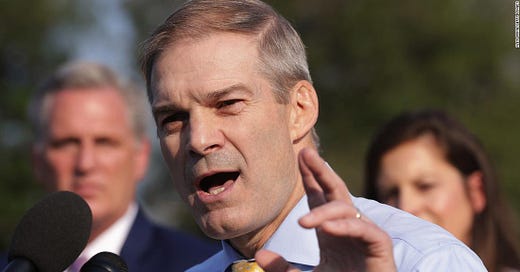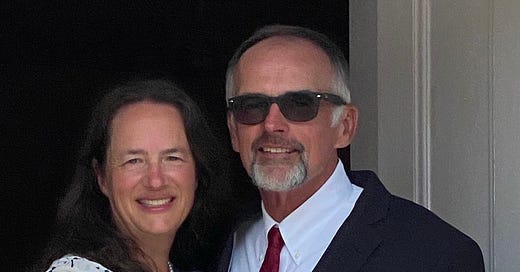
Philip Stephens of Financial Times today pointed out how much global politics has changed since 2016. That was the year of Brexit and Trump, when those calling for national sovereignty and iron-bound borders seemed to have the upper hand, and it seemed we were entering a new era in which nations would hunker down and international cooperation was a thing of the past.
But now, just seven years later, international cooperation is evident everywhere. Stephens pointed out that a series of crises have shown that nations cannot work alone. Migrants fleeing the war in Syria in 2015 made it clear that countries must cooperate to manage national borders. Then Covid showed that we must manage health across political boundaries, and then Russia’s invasion of Ukraine proved that European nations—and other countries on other continents—must stand together militarily in their common defense.
That embrace of cooperation is in no small part thanks to President Joe Biden and Secretary of State Antony Blinken, who have focused on bringing together international coalitions.
The new global stance is on display in the U.S. right now as President Biden hosts the first-ever trilateral summit with Prime Minister Fumio Kishida of Japan and President Yoon Suk Yeol of South Korea. This is not an easy meeting—Japan and South Korea have a long history of conflict—but they are working to mend fences* to stand firm against North Korea, including its missile tests, and to present a united front in the face of Chinese power.
Secretary Blinken noted for reporters on Tuesday that the world is currently being tested by geopolitical competition, climate change, Russia’s war of aggression against Ukraine, and nuclear aggressions. “Our heightened engagement is part of our broader efforts to revitalize, to strengthen, to knit together our alliances and partnerships—and in this case, to help realize a shared vision of an Indo-Pacific that is free and open, prosperous, secure, resilient, and connected,” he said. “And what we mean by that is a region where countries are free to chart their own path and to find their own partners, where problems are dealt with openly, where rules are reached transparently and applied fairly, and where goods, ideas, and people can flow lawfully and freely.”
Cooperation between Japan and South Korea “helps us promote peace and stability and furthers our commitment to the complete denuclearization of the Korean Peninsula. It advances our shared values and helps uphold principles of the UN Charter like sovereignty, independence, territorial integrity. It allows us to even more expand opportunity and prosperity.”
Blinken addressed Ukraine’s resistance to the Russian invasion, backed by an international coalition, and reiterated that Ukrainians are upholding “the basic principles—sovereignty, territorial integrity, independence—that are vital to maintaining international peace and security.”
In squeezing Russia, international cooperation has again been vital. The Swiss corporation Société Internationale de Télécommunications Aéronautiqes (SITA), which is responsible for booking, flight messaging, baggage tracking, and other airline applications, announced in May that it will leave Russia this autumn. Russian carriers are scrambling.
Blinken also confirmed that the Biden administration last week achieved a deal with Iran over U.S. prisoners. Iran moved four dual citizens from the infamous Evin Prison to house arrest, and the U.S. is working to get them, along with one more who was already under house arrest, home. In exchange, the U.S. will release several Iranian prisoners along with $6 billion of Iranian oil revenue currently held in South Korea.
Several Republicans have opposed that deal. The senior Republican on the Senate Foreign Relations Committee, James E. Risch of Idaho, said that the “unfreezing” of funds “incentivizes hostage taking & provides a windfall for regime aggression,” and Senator Tom Cotton (R-AR) called the money “ransom” and said it was a “craven act of appeasement.”
But in an op-ed on the national security website Defense One, Ryan Costello, the policy director for the National Iranian American Council, called the deal a win-win. The Iranian money will be released to Qatar, which will release it for purchases of food and medicine, which are not sanctioned. Medicine is desperately needed in Iran, and as Biden said in 2020: “Whatever our profound differences with the Iranian government, we should support the Iranian people.”
In his remarks to reporters on Tuesday, Blinken defended the administration's withdrawal from Afghanistan almost exactly two years ago, saying the decision to withdraw was “incredibly difficult” but correct. “We ended America’s longest war,” he said. “For the first time in 20 years, we don’t have another generation of young Americans going to fight and die in Afghanistan. And in turn, that has enabled us to even more effectively meet the many challenges of our time, from great power competition to the many transnational issues that we’re dealing with that are affecting the lives of our people and people around the world.”
He noted that the U.S. continues to be the leading donor of humanitarian assistance to Afghanistan, contributing about $1.9 billion since 2021, and that the U.S. continues to work to hold the Taliban accountable for the rights of women and girls.
In Niger, a key U.S. ally in Africa against terrorism, military forces took power from the democratically elected president on July 26, and now the Economic Community of West African States (ECOWAS), a regional union of fifteen countries, has said it will intervene militarily if diplomatic efforts to restore President Mohamed Bazoum to power fail. Army chiefs met today in Ghana to discuss creating a standby force. Nigeria’s chief of defense staff, General Christopher Gwabin Musa, told the meeting: “The focus of our gathering is not simply to react to events, but to proactively chart a course that results in peace and promote[s] stability."
Blinken said Tuesday that the U.S. strongly supports the efforts of ECOWAS to restore Niger’s constitutional order, but the African Union apparently opposes intervention out of concern that such intervention might trigger a civil war.
Meanwhile, in Sudan, where the Biden administration hoped working with two rival generals would pressure them to restore civilian democracy, the country has been torn apart as those two generals now vie for power. Days ago, the U.S. government warned of corruption and human rights violations in South Sudan, with one of the rival military forces, the Rapid Support Forces, apparently engaging in widespread targeted killing and sexual violence in the western Sudan region of Darfur.
Yesterday, the State Department called for the two factions to stop fighting. “Every day this senseless conflict continues, more innocent civilians are killed, wounded, and left without homes, food, or livelihoods. The parties must end the bloodshed. There is no acceptable military solution to this conflict,” it said.
—
*The expression “mending fences” appears to come from U.S. Senator John Sherman (R-OH), who in 1879 told reporters he had to go home to take care of his farm (including mending his fences) when everyone had a pretty shrewd idea he was trying to repair political relationships to shore up support, hoping for a presidential nomination. (It didn’t work: his chief manager was Representative James A. Garfield (R-OH), who ended up getting the nomination himself.)
—
Notes:
https://www.ft.com/content/f0866993-c91e-4c66-bfe3-0d4cb5dd8c7f
https://www.state.gov/secretary-antony-j-blinken-at-a-press-availability-37/
https://www.cotton.senate.gov/news/press-releases/cotton-statement-on-bidens-ransom-to-iran
https://www.defenseone.com/ideas/2023/08/latest-iran-deal-win-win/389330/
https://www.nytimes.com/2023/05/03/us/politics/us-sudan-democracy-war.html
https://www.state.gov/u-s-government-issues-a-business-advisory-for-south-sudan/
https://www.cnn.com/2023/08/16/africa/darfur-sudan-geneina-massacre-account-cmd-intl/index.html
https://www.state.gov/on-fighting-in-nyala-in-south-darfur-sudan/
https://www.reuters.com/world/africa/west-african-army-chiefs-meet-niger-talks-2023-08-17/
https://www.rfi.fr/en/africa/20230817-west-african-bloc-ecowas-niger-au-rebuff-military-move










So refreshing to see the president of the US doing actual politics, after the seemingly endless years of Trump just screaming, bullying and continuously masturbating in front of cameras but amounting to nothing… Even if it isn’t all perfect, Biden is still doing a damn good job.
Thanks for focusing on Biden admin's foreign policy progress. It's easy to miss those things when focused on latest indictment.